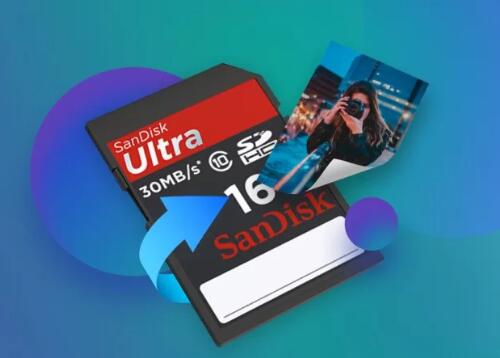Losing pictures from an SD card can be a distressing experience, especially when those images hold sentimental value. Whether due to accidental deletion, corruption, or formatting, there are several methods available to recover your precious memories.
SD Cards
Before diving into recovery methods, it’s essential to understand how SD cards function. SD (Secure Digital) cards are widely used for storing digital data in devices like cameras, smartphones, and tablets. They come in various types (SD, SDHC, SDXC) and capacities. The way data is stored on these cards makes recovery possible, even after deletion or formatting, as long as the data hasn’t been overwritten.
Common Causes of Picture Loss
Accidental Deletion: It’s easy to delete files unintentionally, especially when managing large photo collections.

Formatting: Whether done intentionally or accidentally, formatting an SD card clears the file system, making files inaccessible.
Corruption: Data corruption can occur due to improper removal of the card, power outages, or software crashes.
Virus Infection: Malware can corrupt files or make them disappear entirely.
Physical Damage: Damage to the card can lead to data loss. This might include exposure to water, extreme temperatures, or physical impact.
Step 1: Stop Using the SD Card
When you realize pictures are missing, the first step is to stop using the SD card immediately. Continued use can lead to data being overwritten, significantly reducing the chances of recovery. Avoid taking new pictures, adding files, or modifying existing files on the card.
Step 2: Assess the Situation
Determine the nature of the loss:
Deleted Files: If you accidentally deleted files, recovery might be simpler.
Formatted Card: If the card was formatted, the process may require specialized recovery software.
Corrupted Card: In cases of corruption, repair tools may be necessary before recovery.
Step 3: Use Recovery Software
Panda Assistant
Panda Assistant is an innovative data recovery software designed to help users effortlessly retrieve lost or deleted files from various storage devices, including SD cards, USB drives, and external hard drives. With its user-friendly interface, Panda Assistant simplifies the recovery process, making it accessible for both beginners and experienced users.
The software employs advanced algorithms to scan and recover a wide range of file types, including photos, documents, videos, and more. Whether files were accidentally deleted, lost due to formatting, or became inaccessible due to corruption, Panda Assistant offers a reliable solution to restore your important data.
In addition to its powerful recovery capabilities, Panda Assistant prioritizes data safety, ensuring that recovered files are stored securely and efficiently. Users can easily preview recoverable items before initiating the restoration process, allowing for targeted recovery without unnecessary clutter.
Compatible with multiple operating systems, Panda Assistant stands out in the market for its effectiveness and ease of use. Whether you’re a casual user or a professional, Panda Assistant is your go-to tool for safeguarding and recovering your digital memories. Experience peace of mind knowing that your important files can be recovered quickly and effectively with Panda Assistant.
Step 4: Use Built-in Tools (For Windows Users)
If you prefer not to use third-party software, you can try Windows built-in tools:
1. Windows File History
If you have File History enabled, you can restore deleted files from a previous backup.
Right-click the folder where the pictures were stored, select “Restore previous versions,” and choose a version to restore.
2. Command Prompt
You can try to recover lost files using Command Prompt:
Open Command Prompt as an administrator.
Type chkdsk E: /f (replace E: with your SD card letter) and press Enter.
This command checks for file system errors and may recover some files.
Step 5: Check Backup Services
If you regularly back up your pictures, check your cloud services (like Google Drive, Dropbox, or iCloud) to see if copies of your lost pictures are available.
Step 6: Use Professional Recovery Services
If the above methods fail and the pictures are critical, consider using a professional data recovery service. These services have specialized tools and expertise to recover data from damaged or corrupted SD cards, although they can be expensive.
Preventive Measures
To avoid future data loss, consider these preventive measures:
Regular Backups: Make it a habit to back up your data regularly to an external hard drive or cloud service.
Safely Remove Hardware: Always use the “Eject” option before physically removing your SD card to prevent corruption.
Use Reliable Devices: Ensure that your devices are in good condition and compatible with your SD card to prevent write errors.
Keep Your SD Card in Good Condition: Avoid exposing your SD card to extreme temperatures or moisture, and store it in a protective case.
Use Antivirus Software: Regularly scan your devices and SD cards for viruses and malware.
Losing pictures from an SD card can be frustrating, but with the right tools and methods, recovery is often possible. Always remember to stop using the card immediately, assess the situation, and try software recovery options first. If necessary, don’t hesitate to seek professional help. By implementing preventive measures, you can safeguard your valuable memories for the future.
Additional Resources
User Manuals: Refer to your device’s user manual for specific instructions on managing SD cards.
Online Forums: Communities like Reddit or specialized tech forums can provide additional tips and shared experiences related to data recovery.
About us and this blog
Panda Assistant is built on the latest data recovery algorithms, ensuring that no file is too damaged, too lost, or too corrupted to be recovered.
Request a free quote
We believe that data recovery shouldn’t be a daunting task. That’s why we’ve designed Panda Assistant to be as easy to use as it is powerful. With a few clicks, you can initiate a scan, preview recoverable files, and restore your data all within a matter of minutes.
Subscribe to our newsletter!
More from our blog
See all postsRecent Posts
- Hard drive recovery denver reddit 2025-02-28
- How to recover a deleted slide in powerpoint? 2025-02-27
- How to recover deleted capcut videos? 2025-02-27










